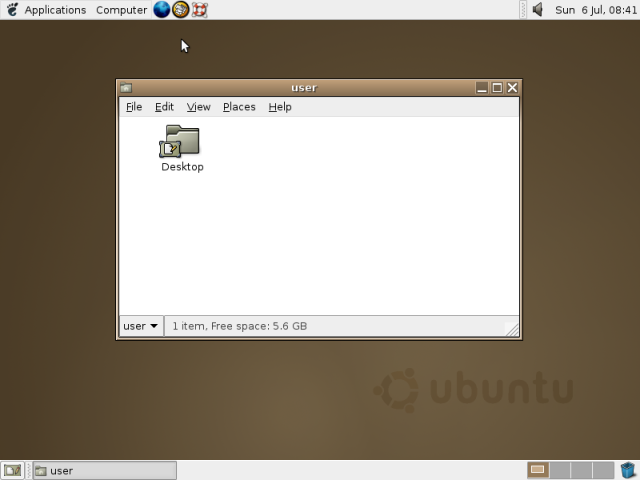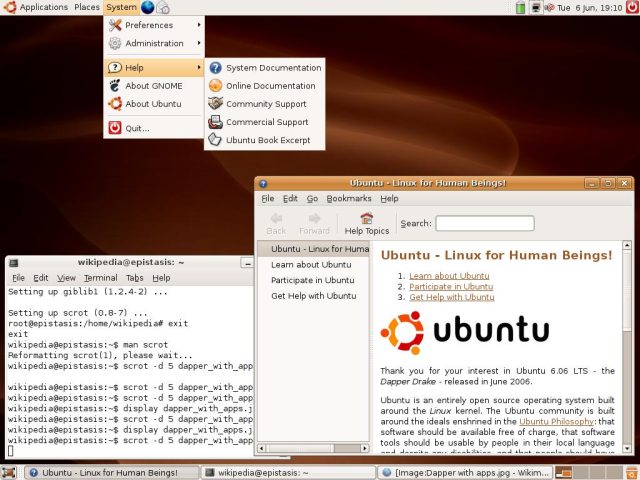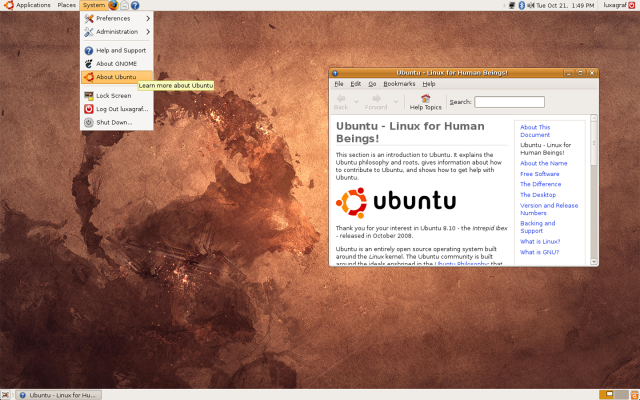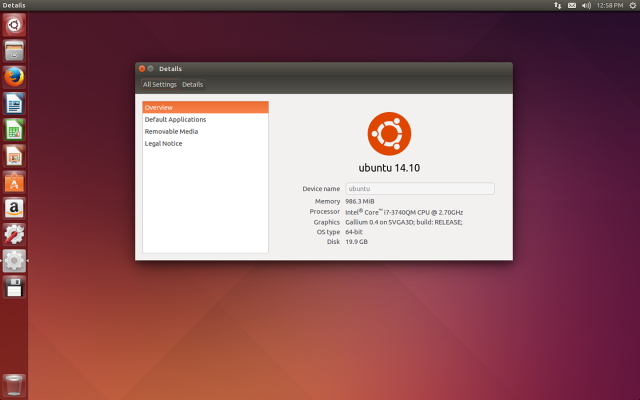Ten years of Ubuntu: How Linux’s beloved newcomer became its criticized king
This article was published in Ars Technica, you can view the original there, complete with graphics, comments and other fun stuff.
In October of 2004, a new Linux distro appeared on the scene with a curious name—Ubuntu. Even then there were hundreds, today if not thousands, of different Linux distros available. A new one wasn’t particularly unusual, and for some time after its quiet preview announcement, Ubuntu went largely unnoticed. It was yet another Debian derivative.
Today, Canonical, the company behind Ubuntu, estimates that there are 25 million Ubuntu users worldwide. That makes Ubuntu the world’s third most popular PC operating system. By Canonical’s estimates, Ubuntu has roughly 90 percent of the Linux market. And Ubuntu is poised to launch a mobile version that may well send those numbers skyrocketing again.
This month marks the tenth anniversary of Ubuntu. As you’ll soon see in this look at the desktop distro through the years, Linux observers sensed there was something special about Ubuntu nearly from the start. However, while a Linux OS that genuinely had users in mind was quickly embraced, Ubuntu’s ten-year journey since is a microcosm of the major Linux events of the last decade—encompassing everything from privacy concerns and Windows resentment to server expansion and hopes of convergence.
Warty Warthog: What’s an Ubuntu?

Starting right from its launch, Ubuntu took a different approach to Linux, one that was perhaps best defined by its slogan at the time: “Linux for human beings.” The word Ubuntu itself recalls the same idea, coming from the South African philosophy where it means, literally, “humanness.” More broadly translated, it’s “humanity toward others.”
This distinction is more than simple semantics. It’s what makes Ubuntu unique in the annals of Linux history.
The name, combined with the slogan, set Ubuntu apart from other Linux distros of the day. Its competitors tended to focus more narrowly on what developers and enterprise users wanted rather than what “ordinary” desktop users might need. Fedora, for example, takes a very different approach, aiming for users who are also developers and will contribute back to open source.
The focus on “Linux for human beings” set the tone and direction of the Ubuntu project from the beginning. Ubuntu never chased developers. It also did not seem interested in the server market. Instead, this distribution was aimed squarely at desktop users (of whom there were significantly fewer in October 2004) and Linux newcomers. The idea was to win over “ordinary” users from Windows.
Ubuntu was started by Mark Shuttleworth, who sold his company Thawte to VeriSign in December 1999 for $575 million. After a short vacation in space, he founded Canonical Ltd and started work on Ubuntu. Shuttleworth’s announcement of the very first Ubuntu release defines the fledgling project as a “new Linux distribution that brings together the extraordinary breadth of Debian with a fast and easy install, regular releases… (and) a tight selection of excellent packages.”
Those goals—fast and easy to install, regular releases with support, and a wide range of applications available—are the basis of what powered Ubuntu to the top of the Linux charts. Perhaps the most significant of these three goals, though, especially in terms of Ubuntu’s focus on new, beginning Linux users is the first one: making Linux easy to install.
By 2004, Debian wasn’t difficult to install if you had prior experience with Linux. For someone accustomed to the installation process offered by Windows XP or Mac OS X, however, it was, at the very least, intimidating. Ubuntu on the other hand was just as easy to install as Windows or OS X. You inserted the CD, it booted, and you double-clicked the installer. When prominent Apple supporter Mark Pilgrim switched to Linux, he chose Ubuntu. Pilgrim joked that it was the African word for “can’t install Debian.”
Its emphasis on newcomers also meant that Ubuntu valued tools experienced Linux users did not, namely graphical installers, well-polished themes, and design details like font rendering. Ubuntu’s designers sweated details about anti-aliasing that previously (seemingly) were never considered in the Linux desktop world. Ubuntu earned the distinction of “Best Newcomer” in Ars’ “Year in Open Source” at the time. Writer Andrew Forgue went so far as to say, “By attempting to create a single distribution with a tweaked desktop, Project Utopia, and a multicultural approach, Ubuntu has come close to being the Holy Grail of Linux for many of us.”
Ubuntu also distinguished itself by something that was all too uncommon in the free software world of 2004—humor. While Shuttleworth’s announcement of the initial release is clearly very serious about Ubuntu’s goals, don’t forget that the nickname for the first version of Ubuntu was “Warty Warthog.” It’s a playful reference to the rough edges that any brand new release will likely have. The cheeky, silly, and often awkward naming convention continues to this day (the latest release is nicknamed Utopic Unicorn).
The humor also extended to Ubuntu’s famous bug number one. The first bug ever filed for Ubuntu was “Microsoft has a majority market share.” The tongue in cheek reference to Windows dominance was a nod to the broader Linux community, which was then drawn together at least as much by what it opposed as what it supported. These days that’s not really a concern for Linux. And when the bug was finally closed in 2013, Shuttleworth wrote that it was “better for us to focus our intent on excellence in our own right, rather than our impact on someone else’s product.”
In many ways, the closing of bug number one marks Ubuntu’s transition from yet another Linux distro to something else, something that the Linux world has never really seen before. It’s now something which no longer even uses the word “Linux” anywhere on its main website.
Dapper Drake: Rising to the top

Ubuntu stuck to its every-six-months plan, churning out progressively more polished releases from 2004 on. In ten years, it has only missed a release deadline once—6.06 Dapper Drake in 2006.
By 2008, Ubuntu established itself as the distro of choice for “switchers” moving away from Windows or OS X or even other distros lacking the ease of use Ubuntu offered. Ubuntu put a friendly face on the otherwise cryptic world of desktop Linux. It offered a simple installation process, the promise of easy updates, and a great selection of applications all available at the click of a button in the Ubuntu Software Center. In short Ubuntu achieved its goals.
Even those who don’t like Ubuntu’s take on the Linux desktop benefited from it over the years, as many of its defining characteristics, particularly the installation process and focus on a well-designed desktop experience. These traits became a priority in other projects, and the result of Ubuntu’s efforts rippled out through the wider Linux world.
Then came the GNOME 3 fork in the road. GNOME, which had been Ubuntu’s default desktop since it launched, decided to redesign its desktop interface. The new GNOME Shell interface was not what Ubuntu wanted. Instead the company decided to write its own shell and desktop interface.
End users wouldn’t actually see the results of Ubuntu’s decision for some time, but the project’s decision to move away from GNOME started a trickle of criticism that would continue to build until Ubuntu’s Unity desktop was revealed in 11.04.
Intrepid Ibex: It’s lonely at the top

The move away from GNOME did not hurt Ubuntu’s adoption rate. It remains the most popular Linux distro by a wide margin, which makes it, among other things, the most popular target for critics. Linux, like every other tightly knit subculture on the Internet, seems to hate a runaway success, especially one that violates so many of the subculture’s taboos.
Violating unwritten Linux taboos became something of an Ubuntu sport over the years. And the critics were there at every turn, even right at the start. For example, as part of its initial launch, Canonical unveiled the Launchpad project hosting platform, but it did not release it under an open source license for another four years. This angered some who saw Canonical as saying one thing and doing another.
Then there were gripes about Ubuntu developers not contributing to the kernel. And then there was the brown theme. Then the purple theme. Then the window buttons moved to the left of the window. The changes got smaller, the nits got pickier, but they were no quieter or less vehement. There’s always someone very vocally unhappy about what Ubuntu is doing.
For many, it all culminated in either Unity, which first debuted in 11.04, or Natty Narwhal (technically it debuted in the netbook remix of 10.10, but that was not widely used). Unity began life as an alternative shell for GNOME 3, but it wasn’t all that different from GNOME 3. Each successive release has used fewer and fewer underlying GNOME and GTK tools. Whether you love Unity or hate it, it is very clearly Ubuntu’s own thing at this point. GNOME is still there under the hood (it needs to be for all the third-party GNOME-based apps that ship with Ubuntu), but Unity relies on it less and less.
While Unity was, at least initially, a bit rough around the edges, what seemed to irk most angry users was simply that it was different. It was not the Ubuntu they had come to know and love. But Ubuntu has rarely backed down due to criticism. And when it has reversed course, it’s usually been the result of feedback from its community of users rather than outside critics. Ubuntu just keeps on pushing ahead with its vision of Linux, which, increasingly, bears little resemblance to the rest of the Linux community.
These days Ubuntu is less a traditional Linux distro and more somewhat like OS X is to BSD. That is, Ubuntu still runs atop a Debian GNU/Linux base and it still uses a Linux kernel, just as somewhere underneath the OS X paint job lies BSD. But much of what the desktop user experiences and interacts with on a daily basis in Ubuntu is a wholly Ubuntu creation.
This chasm between Ubuntu and the rest of the Linux world will only be widening in the next few years as Ubuntu builds its own Mir display server and moves into the mobile space with Ubuntu Touch running on phones and tablets. No matter how that ends up there’s one very safe prediction: Ubuntu will continue to blaze its own path through the Linux woods.
It’s also a safe bet to assume the critics will continue as well. Critics hate utopias. If there’s nothing wrong, there’s nothing to scream about. This seems especially true of Linux reviewers (myself included). That’s not, however, to say that all criticisms leveled at Ubuntu are without merit. The lack of contributions to the kernel project relative to other distros is worrying for anyone interested in the overall health of the Linux ecosystem. If the most popular Linux distro in the world has nothing to contribute, well, that doesn’t bode well for the overall future.
But for every storm brewed in the Ubuntu teacup, there is another facet worth talking about. Ubuntu remains far from perfect, but it is one of the distros most willing to experiment and, perhaps most importantly, admit when it’s wrong.
Utopic Unicorn: Imagining Utopia

Arriving alongside the ten-year anniversary of the project, there’s almost nothing new in the latest version of Ubuntu, 14.10. There’s a kernel update, a few application updates, but nothing major from Ubuntu itself.
There is one bit of good news in the daily builds, though. Ubuntu has started work on a major change that will fix perhaps the biggest tarnishing marks in Ubuntu’s history—removing the privacy-invading online search features.
One of the best parts of Unity is the Dash, a single search interface that will find apps, documents, music, images, and all sorts of other data on your machine. It’s the cornerstone of the Unity interface. The first few releases of Unity focused on local search, but in 12.04 Ubuntu added a feature that enabled online searches as well.
Some users found this incredibly useful. Others, myself included, found it incredibly invasive. The fact that Ubuntu suddenly started shipping with a privacy policy sent many a privacy conscious user scurrying to less “innovative” distros.
What has always been most troubling about the search features in Unity Dash is that they are enabled by default. Given that very few users change default settings—especially new users, Ubuntu’s target audience—it effectively means that users may not be aware their data is being transmitted to Canonical’s servers and then routed on to Amazon and elsewhere.
Free software icon Richard Stallman went so far as to brand Ubuntu 12.04 “spyware.” Even the more restrained Electronic Frontier Foundation (EFF) asked Canonical to turn off the Amazon Lens by default and devoted a series of how-tos to securing Ubuntu. But for two years, Canonical has not backed down on the Amazon search lens, though it did eventually ensure that Amazon responses were served over HTTPS, making it somewhat more secure for users.
However, it wasn’t simply the Amazon controversy that bothered many users. It was Canonical’s, and specifically Shuttleworth’s, response to the criticism that riled many.
When asked about it, Shuttleworth defended the search tools. He wrote, “We are not telling Amazon what you are searching for. Your anonymity is preserved because we handle the query on your behalf. Don’t trust us? Erm, we have root.” While technically correct in the sense that you have to trust someone, there’s a huge difference between trusting FLOSS software updates with published source code and trusting Canonical to keep your private data secure. The former requires trust, the latter asks for blind faith.
Canonical further fanned the flames of the privacy fire by sending a DMCA takedown notice to an EFF staffer who created the site fixubuntu.com, which was critical of Unity’s search tools. The DMCA notice protested the use of Canonical trademarks, but, as the EFF put it in a response, “your request is not supported by trademark law and interferes with protected speech.” While fixubuntu ended up complying, the move felt heavy-handed. (It’s worth noting that fixubuntu was recently forked to create fix-macosx.com, which addresses a similar on-by-default search tool in OS X Yosemite.)
No matter what their intentions may have been, Canonical and Shuttleworth came across like bullies, claiming to have root access to your machine and being unafraid to twist trademark law to silence critics. That’s about what you’d expect from Microsoft, but this kind of bullying is less common in the free software world.
Nov. 2007: We’re only Human after all: a review of Ubuntu 7.10 Gutsy Gibbon
May 2008: The heron has landed: a review of Ubuntu 8.04
Nov. 2009: Good karma: an in-depth review of Ubuntu 9.10
May 2010: Lucid dream: Ars reviews Ubuntu 10.04
Oct. 2010: Blessed Unity: Ars reviews Ubuntu 10.10
Oct. 2011: Desktop dreams: Ubuntu 11.10 reviewed
May 2012: Precision and purpose: Ubuntu 12.04 and the Unity HUD reviewed
Nov. 2012: Review: Ubuntu 12.10 Quantal Quetzal a mix of promise, pain
Oct. 2013: Ubuntu 13.10 review: The Linux OS of the future remains a year away
Apr. 2014: Ubuntu 14.04 review: Missing the boat on big changes
It’s worth looking at the rest of what Shuttleworth wrote in that post, though. “You do trust us with your data already,” he continued. “You trust us not to screw up on your machine with every update. You trust Debian, and you trust a large swath of the open source community. And most importantly, you trust us to address it when, being human, we err.”
That last bit is especially relevant in this case, and it matters for two reasons. First, Shuttleworth apologized for the DMCA takedown notice, and it has never happened again.
More importantly, Ubuntu is reversing course on the Amazon search lens. Sally Radwan, Product Marketing Manager at Canonical, tells Ars that “the opt-in by default is not set to land in 14.10… [but] it is in the development pipeline for 15.04.” That is, Amazon and the rest of the online search features will soon be opt-in (if you update from an existing install it will still be there, but it’s disabled for fresh installs of the latest daily builds). In short, Ubuntu is fixing its mistake even if it has taken a little while.
Still, better late than never, because you do have to trust someone. Like it or not, Ubuntu or whatever your OS of choice is does have root access to your machine. Not literally of course, but it’s effective access given that their code is running with root privileges on your machine and chances are you haven’t reviewed it lately. You trust your distro to make sure that code is secure, stable, and acting in your best interests. You trust them to update it when something goes wrong.
You could look at Ubuntu’s privacy fiasco pessimistically, as proof that Ubuntu is out to get you. Or you could take the more optimistic view: Ubuntu is willing to fix things when it makes bad decisions.
Ubuntu rebranded itself in 2010 and dropped the “Linux for human beings” slogan. It wouldn’t be as catchy, but Ubuntu might do well to bring back its old slogan with a slight update: “Linux for human beings who make mistakes, but try to fix them.”
Vivid Vervet: The mobile future
Ubuntu recently announced that next year’s 15.04 release will be named Vivid Vervet. While Shuttleworth tends to focus on the animal names in his announcement, looking back over Ubuntu’s history reveals that the word accompanying the animal is often the more defining element. From “Warty,” which was all warts and all release, to Lucid, when Ubuntu seems to have developed a more distinct sense of visual and UI direction, to Vivid, which envisions a bright future.
Again, there is almost nothing new from Canonical in Ubuntu 14.10. The reason for that is the project has all available hands working on its Unity 8 mobile interface. The Ubuntu Phone is coming, and for now the desktop is taking a back seat.
Eventually the two will, to use Shuttleworth’s word, converge. Convergence for Ubuntu isn’t just a marketing term, it also seems to be the development strategy. Unity 8 is taking shape on mobile devices, and eventually that work will be extended to embrace the desktop as well. There’s already a “flavor” known as Ubuntu Next if you’d like to preview Unity 8 today.
The only problem for Ubuntu is, well, what if it builds a Linux phone and no one comes?
The proposed Ubuntu Edge phone already has the vivid distinction of being the largest and most spectacularly failed campaign in crowdfunding history. Ubuntu missed its grandiose $32 million dollar goal by $19 million in last year’s effort to raise money from Linux enthusiasts directly. Seen from a more optimistic angle, the $12 million it did raise makes the Edge the biggest-ever fixed crowdfunding campaign.
At any rate, Canonical is having better luck on the software front. It’s not something most people would want to use yet, but Ubuntu Touch exists and will run on a variety of Nexus devices. Devices with Ubuntu Touch preloaded are rumored to be in coming any day now.
Warty Warthog: The sequel
Any numbers surrounding the use of Linux are suspect simply because it’s very hard to track by distro. But again, Canonical tells Ars that the company estimates there are “around 25 million Ubuntu desktop users,” and Canonical claims to have around 90 percent of the Linux market.
And while this retrospective focused solely on the desktop, Ubuntu is no slouch in the server market these days. It now accounts for over 55 percent of all OpenStack deployments and, according to the company, around 70 percent of guest OSes “on major global public cloud environments.”
So even if Ubuntu Touch tanks and Ubuntu goes crawling home with its tail between its legs, it has an impressive home to return to.
It’s hasn’t been a perfect ten years, but it’s difficult to imagine where Linux would be today without Ubuntu. When it debuted in 2004, the most popular desktop was KDE 3.5, the default theme of which looked like a sad clone of Windows 95. Ten years later, Linux is everywhere you look, and most often it’s Ubuntu Linux that you see.
For better or worse, Ubuntu has become the friendly public face of Linux. But as Shuttleworth wrote on his blog several years ago, “free software is bigger than any one project. It’s bigger than the Linux kernel, it’s bigger than GNU, it’s bigger than GNOME and KDE, it’s bigger than Ubuntu and Fedora and Debian. Each of those projects plays a role, but it is the whole which is really changing the world.”